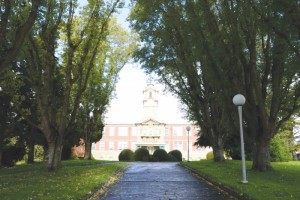Camosun College recently earned a Sustainability Tracking, Assessment & Rating System (STARS) silver rating for its official college sustainability plan.
This was the first time the college completed a STARS evaluation, which is done through the Association for the Advancement of Sustainability in Higher Education (AASHE). STARS uses a four-point ranking system, consisting of bronze, silver, gold, and platinum.
Completing the evaluation process required nine months of data collection, according to Shannon Craig, Camosun interim manager of environmental sustainability. She says it was not an easy nine months, and the college had some struggles, as it was their first time doing the evaluation.
“We found quite quickly that the college does not track all of the metrics that we needed to report on,” says Craig, “or some metrics were tracked in units that were different than how STARS wanted the data reported. It was a great learning experience, though, and next time we access the data, collection should go more smoothly.”

Craig says STARS data is a great tool and it complements the sustainability plan at Camosun as it allows the college to easily make an inventory of where they are in comparison to the targets set out in their plan.
“The sustainability plan at Camosun has two sub-plans,” says Craig. “One focused on teaching and learning, and one on operations and governance. The plan aims to integrate sustainability into teaching and learning, with the end goal resulting in Camosun being a college that excels in environmental sustainability.”
Craig points out the value of programs such as Ready, Set, Solve, which is an applied-learning challenge put on by the Capital Regional District. She says that such programs will help prepare students to play ecologically friendly roles in their community, which will, in turn, help solve sustainability challenges.
“Cities need to experiment on the ground to help solve the complex sustainability challenges they are facing and involve students directly in those solutions,” says Craig. “Students who go through such a program not only gain experience working on real-world projects, engaging and networking with contacts from across multiple fields, but they also gain a unique perspective on sustainability, all of which are not traditional outcomes of regular academic classes.”
Craig works closely with Camosun College Student Society (CCSS) environmental sustainability director Mark Rosini. Rosini says he is looking forward to Camosun’s sustainability plan growing even more, and he adds that he was pleasantly surprised at Camosun’s performance, given that it was the first time the college had completed a STARS evaluation.
“‘Sustainability’ is a very broad term to catalogue things and for people to see what the college is doing,” says Rosini. “It’s great. And, obviously, to quantify it is great, too.”
STARS is separated into four main categories: academics, engagement, operations and planning, and administration. Craig says the sustainability plan at Camosun combines teaching and learning techniques and adds that it all comes down to making resources available for students to play a first-hand role in sustainability in their community.
“I think part of how we prepare students to be stewards and play a role in sustainability is by involving them directly with their learning while being an institution that excels in environmental sustainability in its operations,” says Craig. “On the education side of things, many courses already focus on these complex real-world issues. Many faculty and areas are already doing this well, but the idea can be accelerated.”
Craig says she is excited to be working to develop new opportunities around campus, which she says could include a sustainability week in 2016, and for faculty to integrate more sustainability into curriculum.
“There is a lot that can be done and a lot of opportunities we want to take advantage of, but only so much time and capacity,” says Craig. “But we have used our STARS assessment as a tool for focus areas.”
Only one academic institution, Colorado State University, has received a platinum evaluation from STARS.

